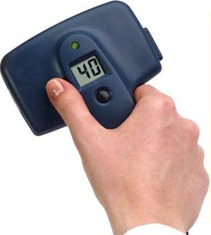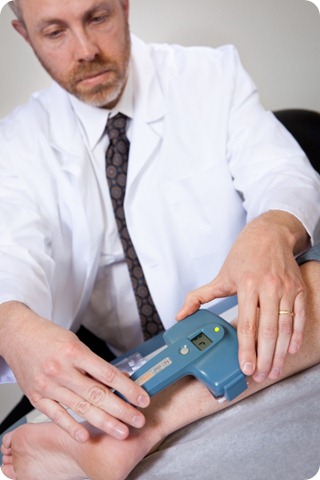About two years ago we changed the focus of NeuroMetrix from general purpose devices, used to perform nerve conduction tests, to devices designed to specifically address diabetic peripheral neuropathy or DPN.
This made strategic sense because the opportunity in the narrowly defined area of DPN was very large and attractive, and our general purpose products which had been very successful were encountering payer resistance.
 Nerve disease is the most common complication of diabetes and effects over 50% of people with diabetes. It can lead to problems with balance resulting in falls, and can lead to foot ulcers which can lead to amputation.
Nerve disease is the most common complication of diabetes and effects over 50% of people with diabetes. It can lead to problems with balance resulting in falls, and can lead to foot ulcers which can lead to amputation.
These complications can be very costly to manage and adversely affect the quality of life of patients. The tools that are generally available to physicians to assess diabetes-related nerve disease are not sophisticated, rely on judgement for interpretation and do not provide quantitative information. They are only effective in detecting late stage disease when the foot has lost its protective sensation.
In late last year, 2011, we launched our first diabetes product, NC-stat DPNCheck which is a rapid, accurate, quantitative, device for assessing diabetic neuropathy at the point of care. This product is used to detect diabetic neuropathy at an early stage and to guide treatment.
Who is the target audience for the device?
NC-stat DPNCheck is designed for use by physicians and other health care professionals who are able to interpret the results and relate the results to their overall assessment of the patient.

We’ve designed the test to integrate smoothly into a busy physician’s practice. The test takes about 20-30 seconds to perform and the results are immediately available.
It is not intended to be self-administered by patients.
How did the creation of the new device originate?
The concept comes from our assessment of market needs. The device itself is based on our proprietary, general purpose nerve testing technology which was been on the market for over a decade and used to perform over 5 million nerve tests.
We’ve refined that technology to focus on a single application, testing the sural nerve which is considered by the medical community to be the gold standard indicator of diabetic peripheral neuropathy.
With this single-nerve focus, we were able to simplify the test, shorten test time, and dramatically lower cost.
In what ways has the medical device been tested?
As I mentioned, the underlying technology for nerve testing was developed by us a decade ago and has been used on over 2 million patients and over 5 million nerve test.
There have been many scientific papers published on the NC-stat technology over the years and it has been used in FDA approved trials. It has a rich pedigree.
Is the testing service now available to the general public and where can it be found?
The product is relatively new to the market having been introduced late last year. Through the end of June, we’ve placed 590 devices with physicians and health care professionals in North America, including WalMart-Canada pharmacies where the test is offered as a part of a comprehensive foot examination at 100 of their stores.
Also, the large San-Antonio, Texas based managed care organization, WellMed, has adopted the technology and plans to test its patient population numbering about 100,000.
Outside of North America, we have distributors in many markets who are starting to introduce the product. This will be an increasing emphasis as we move into 2013 and later years.
How does the medical device fit with NeuroMetrix’s goals?
NC-stat DPNCheck is core to our goal of being the leading medical device company in developing an attractive, profitable franchise in diabetic peripheral neuropathy testing and treatment. It is our first and therefore our foundational product.
Do you have other product plans?
Yes we do. We have an active R&D pipeline and are planning our next product launch for later this year. The product is named SENSUS™. It is a pain management device designed to provide non-pharmacological relief to chronic pain in the lower legs and feet.
Diabetic peripheral neuropathy is often accompanied by pain. In fact, about 10-20% of people with diabetes have pain.
SENSUS is an easy to use, wearable device that provides on-demand pain relief at the push of a button. It also tracks patient usage which is important to the physician’s assessment of effectiveness.
Currently SENSUS is undergoing regulatory review by the FDA and we hope to launch it in the fourth quarter.
At the recent American Diabetes Association meeting SENSUS attracted considerable attention from physicians.
We have other pipeline products that are in early stages of development.
How do you see the future of medical devices for diabetic peripheral neuropathy progressing?
We are all aware of the large and growing prevalence of diabetes. The rate of detection of DPN is lagging the growth and size of the diabetic population. The unmet medical need is real and is increasingly recognized. Our products are targeted at those needs.
We are very encouraged by the early market response to NC-stat DPNCheck. The market segments of endocrinology and podiatry, managed care, and retail health have all shown early uptake.
We are well on our way to a goal of 1,000 devices in the field by the end of the year. SENSUS is a natural follow-up product to the success we are seeing with our diagnostic.
These factors all support our optimism that there is a very attractive franchise to be built in DPN and we are well positioned to do it.
What plans do NeuroMetrix have for the future?
Near term, we plan to stay focused on accelerating adoption of NC-stat DPN check while bringing SENSUS to market in Q4.
Where can readers find more information on the device?
They can visit our website at www.neurometrix.com. They’ll find an array on information of NC-stat DPNCheck and SENSUS. There is a particularly good video on use of NC-stat DPNCheck that readers might find interesting.
About Dr. Shai Gozani
 Dr. Gozani founded NeuroMetrix in 1996 and currently serves as Chairman of the board of directors and as President and Chief Executive Officer.
Dr. Gozani founded NeuroMetrix in 1996 and currently serves as Chairman of the board of directors and as President and Chief Executive Officer.
Prior to forming the company, Dr. Gozani completed a neurophysiology research fellowship in the laboratory of Dr. Gerald Fischbach at Harvard Medical School.
Dr. Gozani holds a B.A. degree in Computer Science, an M.S. degree in Biomedical Engineering and a Ph.D. in Neurobiology, from the University of California, Berkeley. He also received an M.D. from Harvard Medical School and the Harvard-MIT Division of Health Sciences and Technology at M.I.T.